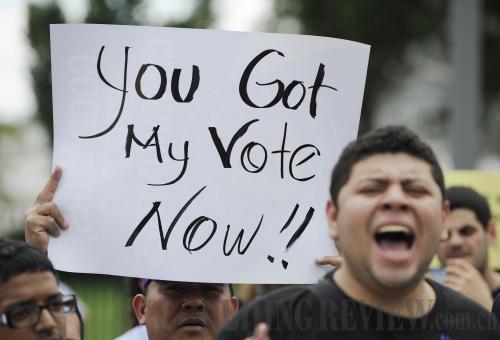|
 |
|
SUPPORT: Demonstraters gather outside the White House to show their support for President Barack Obama's order that it is halting deportation of otherwise law-abiding immigrants brought to the U.S. illegally on June 15, 2012 (XINHUA) |
It's called the "DREAM Act" for a reason. It's the dream of more than 1.7 million young people in the United States -- whose only crime was that they were brought here by their parents or guardians illegally, who study at public schools and want to enter the workforce, the military, or college. It's a simple dream, which asks a simple question: "Am I American?"
Beginning August 15, hundreds of thousands of young illegal immigrants living in the United States are expected to file requests for two-year deferrals of deportation under the Development, Relief and Education for Alien Minors (DREAM) Act. Applicants will be charged $465 for each request, and the Department of Homeland Security has given assurances that the information from the applications would not be used for immigration enforcement, which is handled by a separate agency.
Officials estimate that at least 800,000 immigrants may be eligible for the program, which aims to provide citizenship to law-abiding illegal immigrants under age 31, who came to the United States before turning 16 and have lived in the United States continuously for five years. Applicants must be current students, high school graduates or honorably discharged veterans.
The deferrals are the first step in the Obama administration's announcement in June that it was halting deportation of otherwise law-abiding immigrants brought to the United States illegally. Proponents of immigration reform hope the deferrals will lead to comprehensive reform with a path to citizenship for young illegals, and an opportunity to apply for legal residence. Critics blast the program as being too lenient on the population of more than 10 million undocumented immigrants, who they blame for rising crime rates, high unemployment and the erosion of "American" culture.
The deferral program for young undocumented residents is "another example of how the president's policies put the interests of illegal immigrants ahead of the interests of U.S. citizens and legal immigrants," said Rep. Lamar Smith, a Texas Republican who heads the House Judiciary Committee, adding that he is concerned that applicants will lie about their age and when they came into the United States.
Sen. Charles Grassley, of Iowa, accused Obama of putting "election year politics above responsible policies."
"The president's action is an affront to the process of representative government by circumventing Congress and with a directive he may not have the authority to execute," Grassley warned.
By any measure, however, Obama has taken a relatively hardline stance against illegal immigration. During the three years of his term, the United States has deported more than 1.1 million immigrants, the most of any president since the 1950s.
"Now let's be clear: this is not an amnesty," Obama said of the deferral program. "This is not a path to citizenship. It is not a permanent fix."
The deferral program, while not granting any permanent legal status, clears the way for young undocumented residents to work legally and obtain driver's licenses and other official documents. Obama called it "a temporary stopgap measure" that would "lift the shadow of deportation from these young people" and make immigration policy "more fair, more efficient and more just."
Roughly 68 percent of the potential beneficiaries to the deferral program are originally from Mexico, 13 percent are from other countries in North and Central American and the Caribbean and about 8 percent are from Asia. They call themselves "DREAMers".
"They are Americans in their heart, in their minds, in every single way but one – on paper," President Obama said when announcing the program.
| 